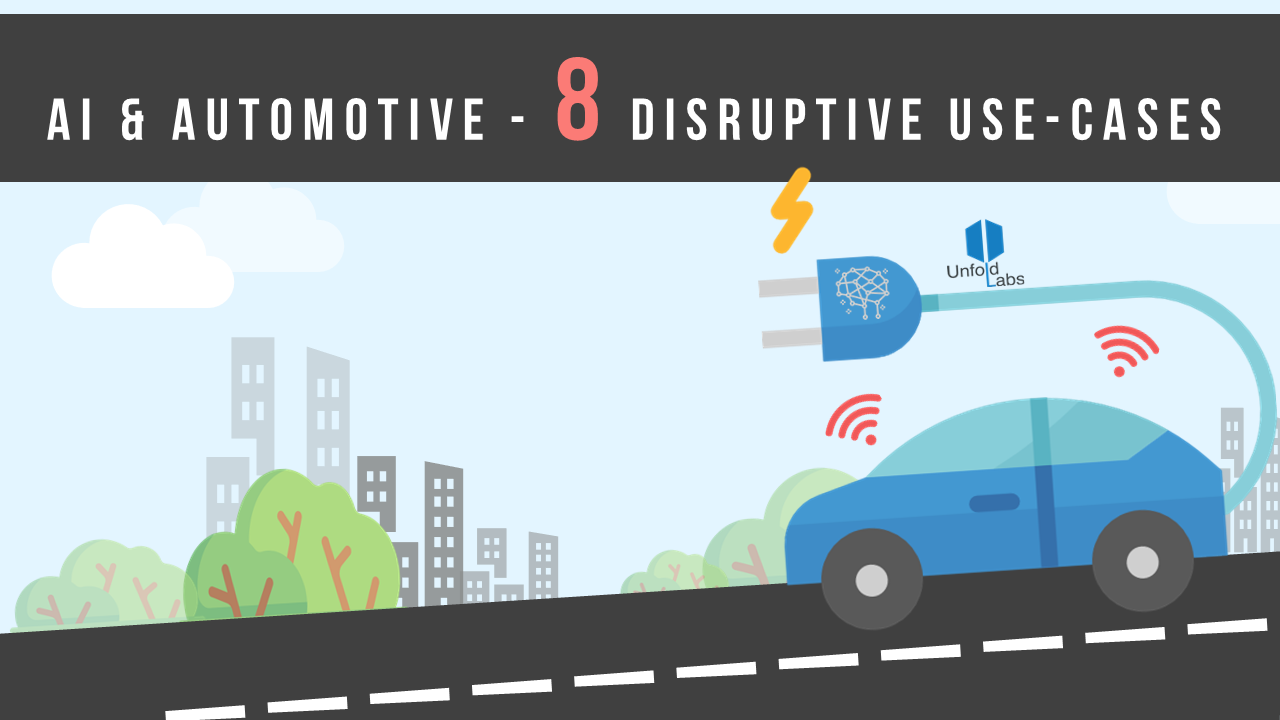Copyright by unfoldlabs.com
 Elon Musk had predicted in 2017 that all the cars will be autonomous in 10 years without any steering wheel. We are quite close to bringing this prediction into reality in just a short time frame of 4 years.
Elon Musk had predicted in 2017 that all the cars will be autonomous in 10 years without any steering wheel. We are quite close to bringing this prediction into reality in just a short time frame of 4 years.
Mercedes-Benz, Volvo, Bosch, Nissan, General Motors, and Continental Automotive Systems, among others, are some of the automotive players striving to gain the first-mover’s advantage in the market through the development of autonomous cars, using the prowess of AI.
Advancements in AI have an immense contribution to the growth of the automotive industry. By 2025, AI will reach an annual value of $215 Billion in the automotive industry, and will move to become a mainstream trend from here on. The United States is currently the largest automobile market worldwide, both in terms of production as well as sales.
The installation of AI-based systems will rise by 109% in 2025. Major players like Audi, Tesla, Hyundai, Benz, Nissan, Kia are striving hard to incorporate AI, automate the cars and are looking ahead to developing tools that can help with the installation of self-sufficient cars.
AI & Automotive — Use Cases
Thank you for reading this post, don't forget to subscribe to our AI NAVIGATOR!
At a high level of abstraction, the following are the ripples of disruptions caused by AI in the automotive industry.
Use Case 1 — Design:
Right from the brainstorming part to developing a working car model, the design and development engineers consider numerous aspects to be as consumer friendly as possible.
Here are a few use cases showcasing how OEMs are using AI to speed up their design workflows:
- Nvidia’s architecture uses AI, real-time ray tracing, and programmable shading to transform the traditional product design process. The advanced ecosystem accelerates new design workflows and improves how teams collaborate. This in turn, reduces the time taken for the approval of a design.
- General Motors’ Dreamcatcher uses Machine Language (ML) for economic prototyping.
The future of car designs lie with Generative Design, where AI algorithms generate hundreds of potential designs just by defining the product idea or the problem. Example — Volkswagen uses generative design to inspire compactness in its vehicles.
Use Case 2 — Manufacturing:
Car manufacturers are using AI in every facet of the car-making process. AI-based systems are enabling robots to pick parts from the conveyor belt with a high rate of success. Using deep learning, the robot automatically determines which parts to pick, how to pick, and in what sequence. This can significantly help reduce the number of workforces, and, in turn, boost the accuracy level of the process. […]
Read more: unfoldlabs.com


A driverless car running on roads may sound like a screen taken from a sci-fi movie. However, fiction is turning into reality, and we thank Artificial Intelligence (AI) for the same. AI technology complements the very concept of self-driving cars.
Copyright by unfoldlabs.com
Mercedes-Benz, Volvo, Bosch, Nissan, General Motors, and Continental Automotive Systems, among others, are some of the automotive players striving to gain the first-mover’s advantage in the market through the development of autonomous cars, using the prowess of AI.
Advancements in AI have an immense contribution to the growth of the automotive industry. By 2025, AI will reach an annual value of $215 Billion in the automotive industry, and will move to become a mainstream trend from here on. The United States is currently the largest automobile market worldwide, both in terms of production as well as sales.
The installation of AI-based systems will rise by 109% in 2025. Major players like Audi, Tesla, Hyundai, Benz, Nissan, Kia are striving hard to incorporate AI, automate the cars and are looking ahead to developing tools that can help with the installation of self-sufficient cars.
At a high level of abstraction, the following are the ripples of disruptions caused by AI in the automotive industry.
Use Case 1 — Design:
Right from the brainstorming part to developing a working car model, the design and development engineers consider numerous aspects to be as consumer friendly as possible.
Here are a few use cases showcasing how OEMs are using AI to speed up their design workflows:
The future of car designs lie with Generative Design, where AI algorithms generate hundreds of potential designs just by defining the product idea or the problem. Example — Volkswagen uses generative design to inspire compactness in its vehicles.
Use Case 2 — Manufacturing:
Car manufacturers are using AI in every facet of the car-making process. AI-based systems are enabling robots to pick parts from the conveyor belt with a high rate of success. Using deep learning, the robot automatically determines which parts to pick, how to pick, and in what sequence. This can significantly help reduce the number of workforces, and, in turn, boost the accuracy level of the process. […]
Read more: unfoldlabs.com
Share this: